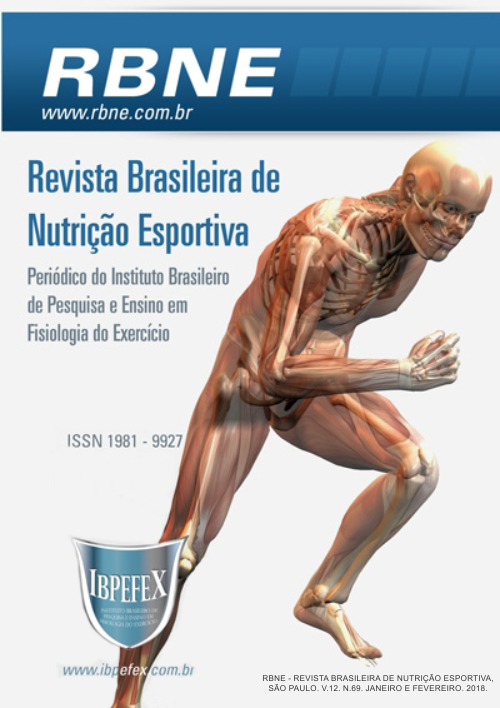The widespread consume of ergogenic supplements in strength training practitioners
Abstract
The aim of the study was to characterize the consumption of nutritional supplements, food and other relevant factors that may influence health and income from bodybuilding practitioner, besides highlighting their point of view about supplementation consumption. We applied a questionnaire with open and closed questions to 55 individuals (male and female, 26.81 ± 8.16 year's average) strength training practitioners in the City of Carapicuiba, São Paulo, Brazil. It can be observe a predominance in the weekly frequency of five days of training where there is widespread consume of dietary supplements and anabolic steroids and in many cases there is negligence of the power of strength training practitioners in question.
References
-Araújo, L. R.; Andreolo, J.; Silva, M. S. Use of dietary supplement and anabolic by body builders in the academies of Goiania-GO. Brazilian Journal of Science and Movement. Vol. 10. Num. 3. 2002.
-Domingues, S. F.; Marins, J. C. B. Use of ergogenic resources and food supplements for practitioners of weight training in Belo Horizonte-MG. Fitness & Performance. Vol. 6. Num. 4. 2007.
-Garber, C. E.; Blissmer, B.; Deschenes, M.R.; Franklin, B. A.; Lamonte, M. J.; Lee, I. M.; Nieman, D. C.; Swain, D. P. ACSM. American College of Sports Medicine position stand. Quantity and quality of exercise for developing and maintaining cardiorespiratory, musculoskeletal, and neuromotor fitness inapparently healthy adults: guidance for prescribing exercise. Med Sci Sports Exerc. Vol. 43. Num. 7. p. 1334-1359. 2011.
-Gomes, G. S.; Degiovanni, G. C.; Garlipp, M. R.; Chiarello, P. G.; Junior, A. A. J. Caracterização Do Consumo De Suplementos Nutricionais Em Praticantes De Atividade Física Em Academias. Medicina (Ribeirão Preto). Vol. 41. Num. 3. p. 327-331. 2008.
-Goston, J. L.; Correia, M. I. T. D. Suplementos nutricionais: Historia, classificação, legislação e uso em ambiente esportivo. Revista nutrição em pauta: Nutrição e esporte. 2009.
-Iriart, J. A. B.; Andrade, T. M. Bodybuilding, steroid use, and risk perception among young bodybuilders of a popular neighborhood of Salvador, Bahia, Brazil. Reports in Public Health. Vol. 18. Num. 5. p. 1379-1387. 2001.
-Iriart, J. A. B.; Chaves, J. C.; Orleans, R. G. Body cult and use of anabolic steroids by bodybuilders. Reports in Public Health. Vol. 25. Num. 4. p. 773-782. 2009.
-Mattos, M. G.; Junior, A. J. R.; Blecher, A. Metodologia da pesquisa em educação física: Construindo sua monografia, artigos e projetos. Phorte editora. São Paulo, 2008.
-Pereira, R. F.; Lajolo, F. M.; Hirschbruch, M. D. consumo de suplementos por alunos de academias de ginástica em São Paulo. Revista de Nutrição, Vol. 16. Num. 3. p. 265-272. 2003.
-Romero, F. G.; Lira, F. S.; Marques, F. A.; Muzy, P. C.; Peres, R. A.; Caperuto, E. C. PAKs supplement improves immune status and body composition but not muscle strength in resistance trained individuals. Journal of theInternational Society of Sports Nutrition. Vol. 7. Num. 36. 2010.
-Santos, A.V.; Farias, F.O. Consumo de suplementos nutricionais por praticantes de atividades físicas em duas academias de Salvador-BA. Revista Brasileira de Nutrição Esportiva. Vol. 11. Num. 64. p. 454-461. 2017. Disponível em: <http://www.rbne.com.br/index.php/rbne/article/view/831/650>
-Silva, L.S.M.F.; Moreau, R.L.M. Uso de esteróides anabólicos androgênicos por praticantes de musculação de grandes academias da cidade de São Paulo. Rev. Bras. Cienc. Farm. Vol. 39. Num. 3. p. 327-333. 2003.
-Szuck, P.; Salgueirosa, F.; Venturi, I.; Características do consumo de suplementos proteicos e aminoácidos por praticante de exercícios contra resistidos das academias da cidade de Canoinhas, SC -Brasil. Revista Saber Científico. Vol. 3. Num. 1. p. 1-11. 2011.
-Thomas, J. R.; Nelson, J. K. Research methods in physical activity. Porto Alegre: Artmed, 2002.
-World Health Organization, World Medical Association Declaration of Helsinki, Ethical Principles for Medical Research Involving Human Subjects. Bulletin of the World Health Organization. Vol. 79. Num. 4. 2001.
Authors who publish in this journal agree to the following terms:
- Authors retain the copyright and grant the journal the right of first publication, with work simultaneously licensed under the Creative Commons Attribution License BY-NC which allows the sharing of the work with acknowledgment of the authorship of the work and initial publication in this journal.
- Authors are authorized to enter into additional contracts separately for non-exclusive distribution of the version of the work published in this journal (eg, publishing in institutional repository or book chapter), with acknowledgment of authorship and initial publication in this journal.
- Authors are allowed and encouraged to post and distribute their work online (eg, in institutional repositories or on their personal page) at any point before or during the editorial process, as this can bring about productive change as well as increase impact and impact. citation of published work (See The Effect of Free Access).






